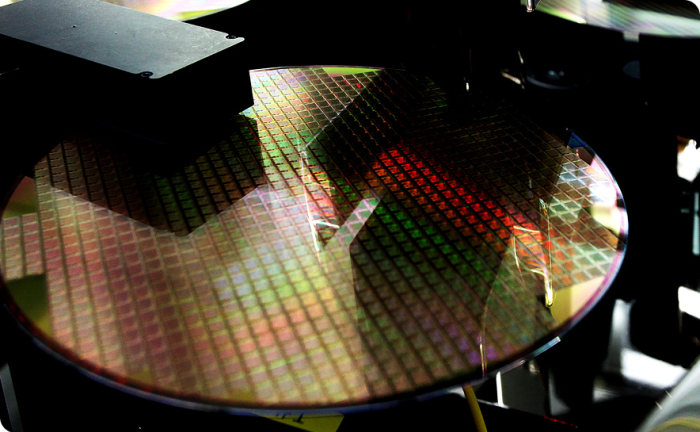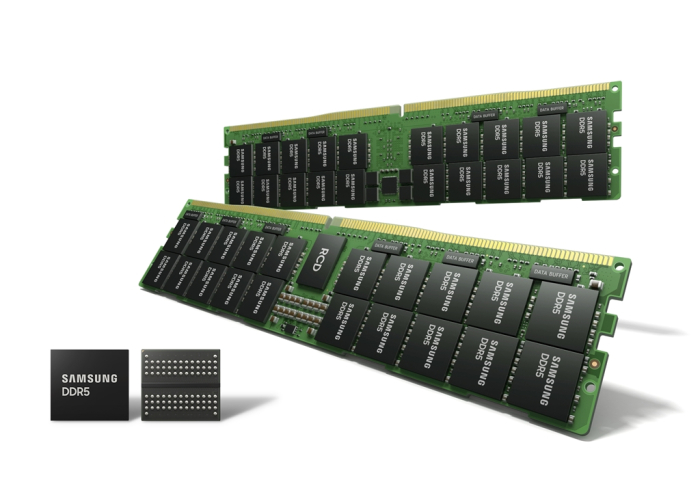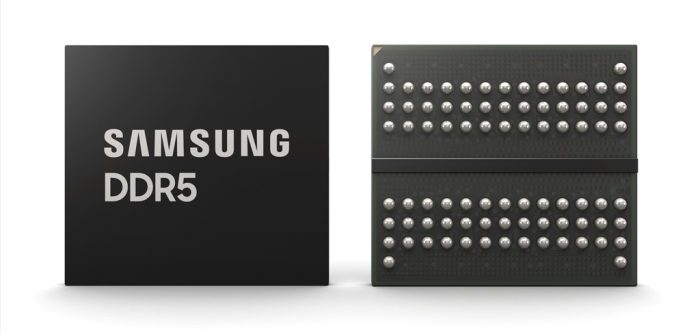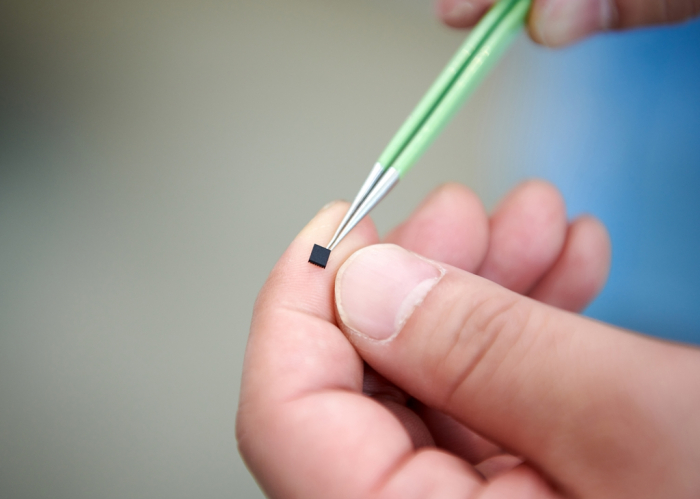Semiconductors
Samsung makes industryŌĆÖs smallest 14 nm DDR5 chip with EUV technology
The latest chip will strengthen SamsungŌĆÖs technology leadership and provide support for falling chip prices
By Oct 12, 2021 (Gmt+09:00)
4
Min read
Most Read
Alibaba eyes 1st investment in Korean e-commerce platform


Blackstone signs over $1 bn deal with MBK for 1st exit in Korea


NPS loses $1.2 bn in local stocks in Q1 on weak battery shares


OCI to invest up to $1.5 bn in MalaysiaŌĆÖs polysilicon plant


Korea's Lotte Insurance put on market for around $1.5 bn



Samsung Electronics Co., the worldŌĆÖs largest memory chipmaker, said on Tuesday it has begun mass production of the industryŌĆÖs smallest 14-nanometer DRAM chips using extreme ultraviolet (EUV) technology, further widening its lead in the memory sector.
The move is significant in that the South Korean tech giant is applying the EUV technology to the industryŌĆÖs finest 14 nm fabrication process to manufacture next-generation double data rate 5 (DDR5) chips in large quantities.
Memory makers such as Micron Technology Inc. and SK Hynix Inc. have said they would also mass-produce DDR5 chips, but the quality of the product and production yields are said to be unsatisfactory, according to industry officials.
DDR5 is the next-generation DRAM chip that boasts a faster speed and higher density with reduced power consumption compared to DDR4 chips. The latest memory is suitable for data-hungry supercomputing, artificial intelligence and machine learning applications, Samsung said.
ŌĆ£We have led the DRAM market for nearly three decades by pioneering key patterning technology innovations. Samsung is setting another technology milestone with multi-layer EUV that has enabled miniaturization at 14 nanometers, a feat not possible with the conventional argon fluoride process,ŌĆØ said Lee Joo-young, senior vice president and head of DRAM product & technology at Samsung.
ŌĆ£Building on this advancement, we will continue to provide the most differentiated memory solutions by fully addressing the need for greater performance and capacity in the data-driven world of 5G, AI and the metaverse.ŌĆØ

EUV is a chip fabricating technology that reduces the steps in multi-patterning and improves patterning accuracy on wafers, ensuring better semiconductor performance and greater yields as well as a shorter chip development time.
Samsung said its five-layer EUV process enables the industryŌĆÖs highest DRAM bit density, enhancing overall wafer productivity by about 20%.
In addition, the 14 nm process will slash power consumption by nearly 20% compared to the previous-generation DRAM node, it said.
The company said its latest DDR5 has a data processing speed of 7.2 gigabits per second (Gbps), more than double the DDR4 speed of up to 3.2 Gbps.
DDR5 TO GIVE SUPPORT FOR PRICE FALLS
Samsung applied the EUV technology to its DRAM production for the first time among DRAM makers back in March 2020.
The company said at the time it was introducing its first DDR5 DRAM module with 512-gigabyte capacity that was made with eight layers of 16 Gb chips. For the latest 14 nm DDR5 chip, Samsung said it is offering modules using 24 Gb chips.
Analysts say the new DDR5 memory will help Samsung strengthen its business cooperation with its clients, including Intel, which is developing next-generation platforms for edge computing and cloud data centers.

If the latest chip becomes mainstream in the DRAM market, it will also provide support for falling DRAM prices, industry watchers said.
According to market tracker Omdia, DDR5 will account for 40.5% of the global DRAM market by 2025 from a mere 0.1% this year.
Samsung is the worldŌĆÖs largest DRAM memory chipmaker with $7.17 billion in DRAM revenue, accounting for 41.2% of the global market, as of the third quarter of 2020, according to Omdia. Local rival SK Hynix comes second with $4.93 billion revenue and 28.3% market share.
SAMSUNG SHARES AT 10-MONTH LOW
On Tuesday, SamsungŌĆÖs shares fell below the 70,000 won level for the first time in 10 months, weighed down by the gloomy industry view that the memory sector will slow in the coming quarters.
The stock finished 3.5% lower at 69,000 won, underperforming the broader Kospi marketŌĆÖs 1.4% decline.
The weak stock performance came just a few days after the company posted its highest quarterly operating profit in three years, with its revenue exceeding 70 trillion won ($58 billion) for the first time.

Samsung said on Oct. 8 that its preliminary operating profit jumped 27.9% on-year to 15.8 trillion won in the third quarter, while its sales rose 9% to 73 trillion won.
However, seven brokerages cut their target price for Samsung, citing expectations for weaker fourth-quarter earnings compared with year-earlier results.
ŌĆ£Demand uncertainty has heightened following the electricity crisis in China, which is affecting production at PCB and other electronic gadget makers,ŌĆØ said KB Securities analyst Kim Dong-won.
ŌĆ£Market concerns are growing that memory chip prices will soon be decided not by suppliers but by their clients.ŌĆØ
Write to Shin-Young Park and Sung-Mi Shim at nyusos@hankyung.com
In-Soo Nam edited this article.
More to Read
-
 Foundry competitionSamsung to make 2-nanometer GAA chips by 2025 to overtake TSMC
Foundry competitionSamsung to make 2-nanometer GAA chips by 2025 to overtake TSMCOct 07, 2021 (Gmt+09:00)
3 Min read -
 Semiconductor rivalryMemory leader Samsung aims to strengthen system chips, foundry
Semiconductor rivalryMemory leader Samsung aims to strengthen system chips, foundryJun 08, 2021 (Gmt+09:00)
3 Min read
Comment 0
LOG IN


